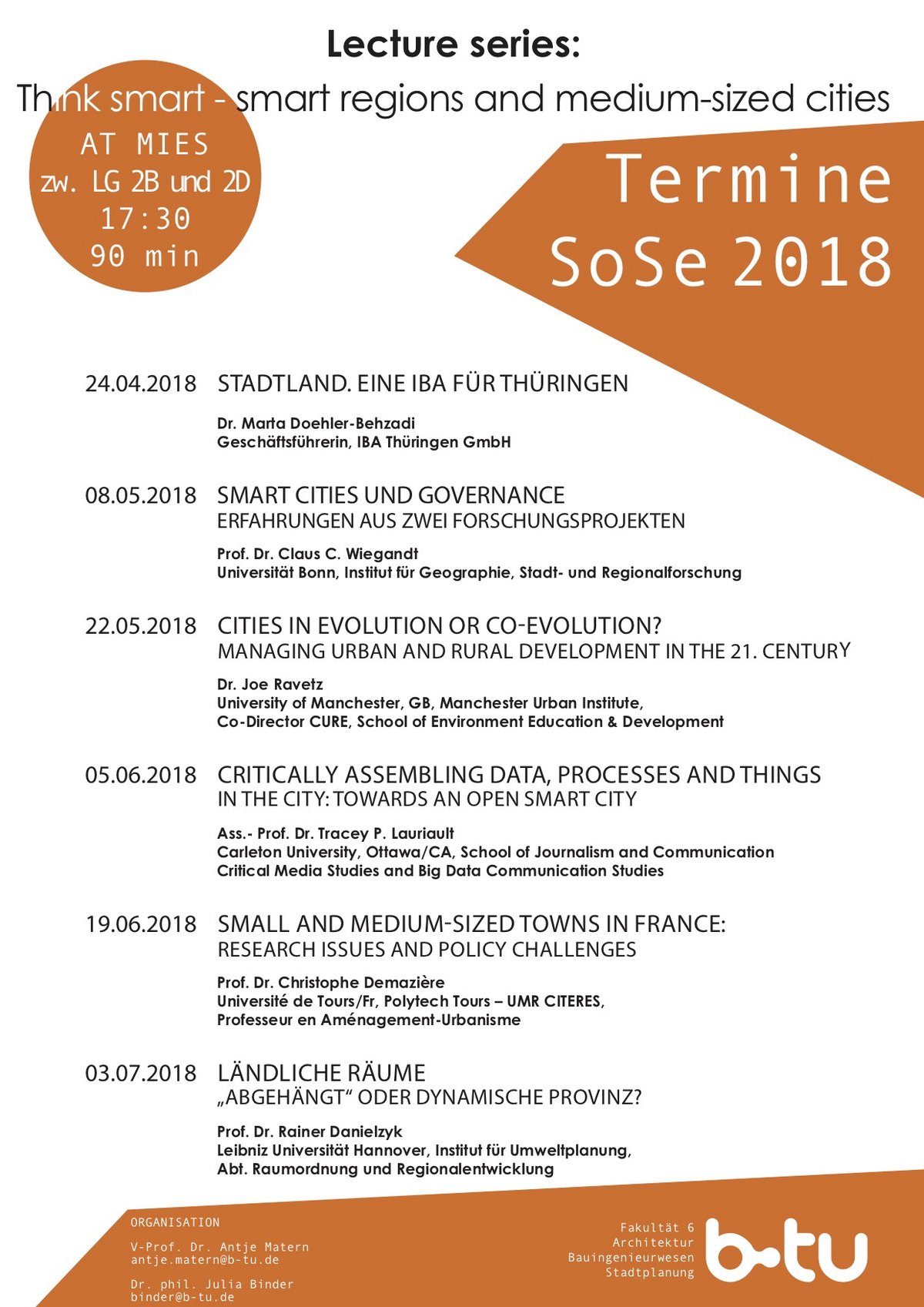Dr. Joe Ravetz "CITIES IN EVOLUTION OR CO-EVOLUTION? - MANAGING URBAN AND RURAL DEVELOPMENT IN THE 21. CENTURY"
Dr. Joe Ravetz
University of Manchester, GB, Manchester Urban Institute,
Co-Director CURE, School of Environment Education & Development
Unsere Vortragsreihe zum Thema "Think Smart - smart regions an Medium-sized cities" ist vollständig und dazu möchten wir euch / Sie herzlich dazu einladen.
"Cities in evolution or co-evolution? Managing urban and rural development in the 21. Century"
Vortrag und Diskussion finden in englischer Sprache statt. Für den ersten Überblick hier ein Abstract:
Abstract Dr. Joe Ravetz: "Cities in evolution or co-evolution? Managing urban and rural development in the 21. Century"
This lecture is a story of a journey through 25 years of sustainable city research, around Europe and beyond. Here there are three of many possible themes, in a ‘Nexus’, a cluster of inter-connecting problems and opportunities. For these and similar challenges of the 21st century, it seems we need new insights, not only for ‘cities in evolution’ (Geddes 1915), but the ‘urban systems in co-evolution’.
Sustainable cities and regions: the idea of integrated analysis and integrated policy for social, economic and environmental systems was shown in the 1990s: (https://www.amazon.co.uk/City-Region-2020-Integrated-Sustainable-Environment/dp/1853836060).
Experience since then showed that such good ideas often don’t work: we have to move, from the sustainability of ‘things’ to sustainability of ‘thinking’. A Toolkit for this is under development in Finland (www.bemine.fi )
Peri-urban development: the most visible trend is peri-urban expansion and urban sprawl. The PLUREL project (www.plurel.org – the largest ever project on the peri-urban), found that EU cities are not only growing but restructuring their whole spatial logic. To understand this, and design policy responses, we need to look at whole city systems.
Smart cities and ‘smart-wise cities’: the rapid spread of SMAC (‘social, mobile, analytics, cloud’) technologies is a catalyst of change and transformation at every level. Smart systems can be very efficient, but too often, public services are disrupted, workers are exploited, taxes are avoided and data is extracted. Digital technology can enable the forces of inequality and exclusion, unless strong policies resist them. In response we can look for ‘wise’ city systems, where profits are recirculated, data is open, public services are integrated and workers / customers are valuable stakeholders. Here, urban systems are steered towards societal benefit, with urban planning, energy / water systems, housing systems, social care or social enterprise. A current program in India shows a global perspective on this – www.manchester.ac.uk/synergistics/collaboratorium/smart-wise-cities-india/
All these depend on the co-evolutionary ‘thinking’ of cities – a collective urban intelligence, a ‘deeper city mind’, which links all parts of society.
The research question then is how to map and explore the pathways ‘from smart to wise’ – from a technology-driven ‘smart’ city, towards a more societal ‘wise’ city? And then the question for policy is what is to be done?? Your advice will be very welcome.
Wir möchten die Impulsvorträge unserer Referent*innen zum Anlass nehmen, um im Institut, der Fakultät und der BTU in den Dialog zu kommen: zu smart Regions bzw. Regionen und Provinzstädten im digitalen Wandel und deren Gestaltungsoptionen. Wir freuen uns dabei auf spannende Impulsvorträge zu Stadt-Land-Beziehungen in Frankreich, Großbritannien und Deutschland und Perspektiven auf die Gestaltung von Smart Cities in Kanada oder deutschen Mittelstädten.
Die Vorträge finden 14-tägig am Dienstag 17:30 Uhr im Mies Atelier (LG2 CD) statt.
Im Anschluss an die Vorträge gibt es die Möglichkeit zu einem lockeren Austausch.


